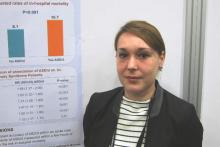SAN DIEGO – Screening for acute stress disorder with depression upon hospital admission for acute coronary syndrome enables physicians to identify a subgroup of ACS patients at increased risk for in-hospital mortality, Dr. Edina Cenko reported at the annual meeting of the American College of Cardiology.
“It’s a simple, quick test that’s easy to do in clinical practice, and it identifies a group of ACS patients who warrant special attention. It’s important for physicians to do because most deaths in ACS patients occur before arrival at the hospital or in-hospital,” said Dr. Cenko of the University of Bologna (Italy).
She presented a study of 5,880 patients enrolled in the International Survey of Acute Coronary Syndromes in Transitional Countries, all of whom had survived day 1 following admission for ACS at seven Serbian hospitals during 2009-2014. They were screened for acute stress disorder (ASD) and depression upon admission.
Patients who met the inclusion criteria for ASD due to a traumatic event occurring within 4 weeks prior to their ACS and who also had at least mild depression upon admission as indicated by a score of 8 or more out of a possible 27 points on the Patient Health Questionnaire-9 had a significantly higher subsequent in-hospital mortality: 10.7% compared with 8.1%.
The prevalence of ASD with depression was 51% in patients with ST-elevation MI compared with 67% in those with non–ST-elevation ACS. Upon statistical adjustment for these and other clinical and demographic factors, patients with ASD plus depression were 68% more likely to die in-hospital. Upon further adjustment for the use of guideline-recommended medications and percutaneous coronary intervention, the ASD/depression group remained at 35% increased risk of in-hospital mortality.
Dr. Cenko explained that this study was conducted in Serbia because the nation’s turbulent history in recent decades made for an enriched population of individuals with ASD.
Acute stress disorder was introduced as a new diagnosis in the Diagnostic and Statistical Manual of Mental Disorders, Fourth Edition. The diagnosis was created for patients who met most of the criteria for posttraumatic stress disorder except their duration of symptoms was insufficient because the traumatic event had taken place too recently to qualify for PTSD. The diagnosis of ASD is included in DSM-5 as well.
The physician-investigators in the international registry identified ACS patients as having ASD if they had experienced a traumatic event within 4 weeks preceding the ACS and about which they were experiencing intrusive thoughts, memories, or nightmares, avoidance of situations that reminded them about the traumatic event, and increased arousal as typically manifest in insomnia and/or irritability.
Dr. Cenko reported having no financial conflicts regarding her study.


